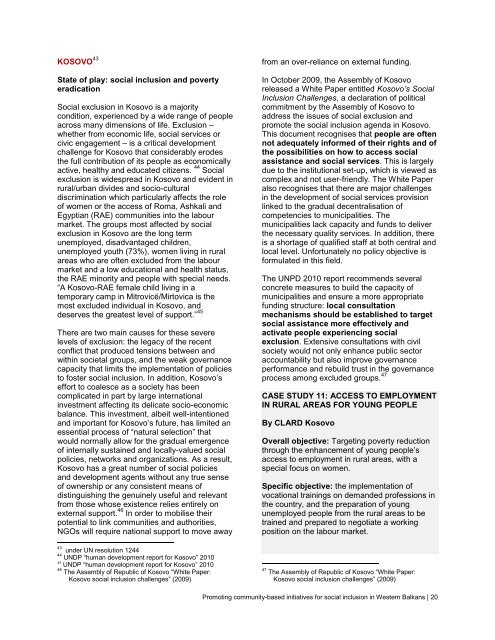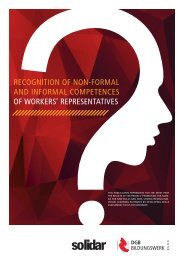Promoting community-based initiatives for social inclusion ... - Solidar
Promoting community-based initiatives for social inclusion ... - Solidar
Promoting community-based initiatives for social inclusion ... - Solidar
Create successful ePaper yourself
Turn your PDF publications into a flip-book with our unique Google optimized e-Paper software.
KOSOVO 43<br />
State of play: <strong>social</strong> <strong>inclusion</strong> and poverty<br />
eradication<br />
Social exclusion in Kosovo is a majority<br />
condition, experienced by a wide range of people<br />
across many dimensions of life. Exclusion –<br />
whether from economic life, <strong>social</strong> services or<br />
civic engagement – is a critical development<br />
challenge <strong>for</strong> Kosovo that considerably erodes<br />
the full contribution of its people as economically<br />
active, healthy and educated citizens. 44 Social<br />
exclusion is widespread in Kosovo and evident in<br />
rural/urban divides and socio-cultural<br />
discrimination which particularly affects the role<br />
of women or the access of Roma, Ashkali and<br />
Egyptian (RAE) communities into the labour<br />
market. The groups most affected by <strong>social</strong><br />
exclusion in Kosovo are the long term<br />
unemployed, disadvantaged children,<br />
unemployed youth (73%), women living in rural<br />
areas who are often excluded from the labour<br />
market and a low educational and health status,<br />
the RAE minority and people with special needs.<br />
“A Kosovo-RAE female child living in a<br />
temporary camp in Mitrovicë/Mirtovica is the<br />
most excluded individual in Kosovo, and<br />
deserves the greatest level of support.” 45<br />
There are two main causes <strong>for</strong> these severe<br />
levels of exclusion: the legacy of the recent<br />
conflict that produced tensions between and<br />
within societal groups, and the weak governance<br />
capacity that limits the implementation of policies<br />
to foster <strong>social</strong> <strong>inclusion</strong>. In addition, Kosovo‟s<br />
ef<strong>for</strong>t to coalesce as a society has been<br />
complicated in part by large international<br />
investment affecting its delicate socio-economic<br />
balance. This investment, albeit well-intentioned<br />
and important <strong>for</strong> Kosovo‟s future, has limited an<br />
essential process of “natural selection” that<br />
would normally allow <strong>for</strong> the gradual emergence<br />
of internally sustained and locally-valued <strong>social</strong><br />
policies, networks and organizations. As a result,<br />
Kosovo has a great number of <strong>social</strong> policies<br />
and development agents without any true sense<br />
of ownership or any consistent means of<br />
distinguishing the genuinely useful and relevant<br />
from those whose existence relies entirely on<br />
external support. 46 In order to mobilise their<br />
potential to link communities and authorities,<br />
NGOs will require national support to move away<br />
43 under UN resolution 1244<br />
44 UNDP “human development report <strong>for</strong> Kosovo” 2010<br />
45 UNDP “human development report <strong>for</strong> Kosovo” 2010<br />
46 The Assembly of Republic of Kosovo “White Paper:<br />
Kosovo <strong>social</strong> <strong>inclusion</strong> challenges” (2009)<br />
from an over-reliance on external funding.<br />
In October 2009, the Assembly of Kosovo<br />
released a White Paper entitled Kosovo’s Social<br />
Inclusion Challenges, a declaration of political<br />
commitment by the Assembly of Kosovo to<br />
address the issues of <strong>social</strong> exclusion and<br />
promote the <strong>social</strong> <strong>inclusion</strong> agenda in Kosovo.<br />
This document recognises that people are often<br />
not adequately in<strong>for</strong>med of their rights and of<br />
the possibilities on how to access <strong>social</strong><br />
assistance and <strong>social</strong> services. This is largely<br />
due to the institutional set-up, which is viewed as<br />
complex and not user-friendly. The White Paper<br />
also recognises that there are major challenges<br />
in the development of <strong>social</strong> services provision<br />
linked to the gradual decentralisation of<br />
competencies to municipalities. The<br />
municipalities lack capacity and funds to deliver<br />
the necessary quality services. In addition, there<br />
is a shortage of qualified staff at both central and<br />
local level. Un<strong>for</strong>tunately no policy objective is<br />
<strong>for</strong>mulated in this field.<br />
The UNPD 2010 report recommends several<br />
concrete measures to build the capacity of<br />
municipalities and ensure a more appropriate<br />
funding structure: local consultation<br />
mechanisms should be established to target<br />
<strong>social</strong> assistance more effectively and<br />
activate people experiencing <strong>social</strong><br />
exclusion. Extensive consultations with civil<br />
society would not only enhance public sector<br />
accountability but also improve governance<br />
per<strong>for</strong>mance and rebuild trust in the governance<br />
process among excluded groups. 47<br />
CASE STUDY 11: ACCESS TO EMPLOYMENT<br />
IN RURAL AREAS FOR YOUNG PEOPLE<br />
By CLARD Kosovo<br />
Overall objective: Targeting poverty reduction<br />
through the enhancement of young people‟s<br />
access to employment in rural areas, with a<br />
special focus on women.<br />
Specific objective: the implementation of<br />
vocational trainings on demanded professions in<br />
the country, and the preparation of young<br />
unemployed people from the rural areas to be<br />
trained and prepared to negotiate a working<br />
position on the labour market.<br />
47 The Assembly of Republic of Kosovo “White Paper:<br />
Kosovo <strong>social</strong> <strong>inclusion</strong> challenges” (2009)<br />
<strong>Promoting</strong> <strong>community</strong>-<strong>based</strong> <strong>initiatives</strong> <strong>for</strong> <strong>social</strong> <strong>inclusion</strong> in Western Balkans | 20
















